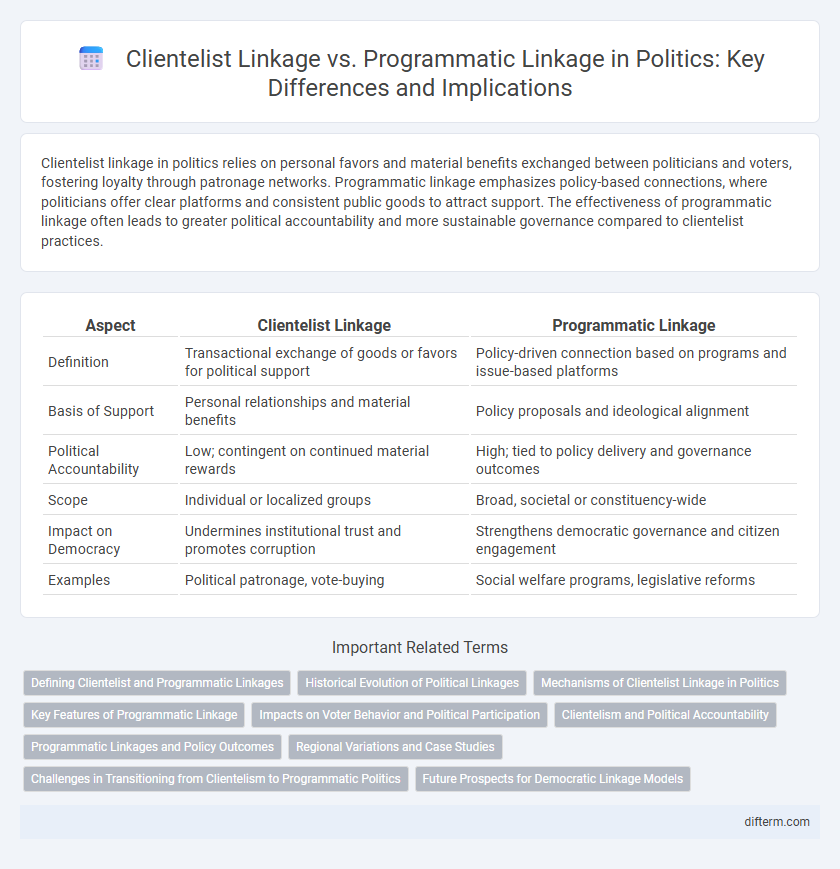Clientelist linkage in politics relies on personal favors and material benefits exchanged between politicians and voters, fostering loyalty through patronage networks. Programmatic linkage emphasizes policy-based connections, where politicians offer clear platforms and consistent public goods to attract support. The effectiveness of programmatic linkage often leads to greater political accountability and more sustainable governance compared to clientelist practices.
Table of Comparison
| Aspect | Clientelist Linkage | Programmatic Linkage |
|---|---|---|
| Definition | Transactional exchange of goods or favors for political support | Policy-driven connection based on programs and issue-based platforms |
| Basis of Support | Personal relationships and material benefits | Policy proposals and ideological alignment |
| Political Accountability | Low; contingent on continued material rewards | High; tied to policy delivery and governance outcomes |
| Scope | Individual or localized groups | Broad, societal or constituency-wide |
| Impact on Democracy | Undermines institutional trust and promotes corruption | Strengthens democratic governance and citizen engagement |
| Examples | Political patronage, vote-buying | Social welfare programs, legislative reforms |
Defining Clientelist and Programmatic Linkages
Clientelist linkages refer to political relationships where goods, services, or favors are exchanged for electoral support, often emphasizing personal connections and reciprocal loyalty. Programmatic linkages involve policy-based relationships where political support is garnered through promises of public goods, transparent governance, and adherence to formal ideological platforms. The distinction highlights clientelist systems' reliance on informal and personalized exchanges, contrasting with programmatic systems' focus on institutionalized, issue-oriented voter engagement.
Historical Evolution of Political Linkages
Political linkages have evolved from predominantly clientelist models, characterized by personalized exchanges and patronage networks, to more programmatic linkages emphasizing policy-based connections between parties and voters. This shift gained momentum post-World War II with democratization and the rise of mass political parties advocating clear ideological platforms and institutionalized policy promises. Historical transitions in electoral systems and social mobilization strategies have significantly influenced the balance between clientelist and programmatic demands in contemporary political landscapes.
Mechanisms of Clientelist Linkage in Politics
Clientelist linkage in politics operates through personalized exchanges where politicians offer targeted benefits or resources directly to individuals or small groups in return for political support, often bypassing formal institutions. Key mechanisms include vote-buying, patronage networks, and the distribution of material goods or favors to secure loyalty and mobilize electoral support. This contrasts with programmatic linkage, which relies on policy promises and institutionalized accountability to build broader political support based on collective interests.
Key Features of Programmatic Linkage
Programmatic linkage in politics is characterized by systematic, policy-based interactions between voters and elected officials, emphasizing transparent criteria for resource distribution and accountability. This linkage relies on clear policy platforms, regular communication of government performance, and mechanisms that allow voters to hold politicians accountable for their promises. The key features include institutionalized channels for feedback, consistent policy delivery, and an emphasis on long-term governance outcomes rather than short-term clientelist exchanges.
Impacts on Voter Behavior and Political Participation
Clientelist linkage fosters direct exchanges between politicians and voters, often leading to short-term voter support driven by material incentives, which can undermine democratic accountability and perpetuate inequality. In contrast, programmatic linkage encourages policy-oriented engagement, promoting informed voter behavior and higher levels of political participation based on shared ideological or policy preferences. Empirical studies show that programmatic linkages correlate with increased voter turnout, stronger party loyalty, and enhanced responsiveness in governance compared to clientelist relationships.
Clientelism and Political Accountability
Clientelism undermines political accountability by prioritizing personalized exchanges of goods and services for electoral support, weakening institutional transparency and governance effectiveness. Unlike programmatic linkages that foster policy-driven voter engagement and responsiveness, clientelist networks perpetuate dependency and reduce incentives for politicians to deliver public goods. This dynamic often results in skewed resource allocation, eroding democratic accountability and entrenching corruption within political systems.
Programmatic Linkages and Policy Outcomes
Programmatic linkages prioritize policy outcomes by establishing direct, transparent relationships between politicians and constituents, emphasizing issue-based platforms rather than personal favors. These linkages facilitate consistent policy implementation, enhance accountability, and improve public trust by aligning government actions with voters' preferences and needs. Evidence shows that programmatic linkages correlate with higher quality governance and more equitable resource distribution compared to clientelist systems.
Regional Variations and Case Studies
Clientelist linkage often prevails in regions with weaker institutional structures and limited access to state resources, where personal networks and reciprocal exchanges dominate political interactions. Conversely, programmatic linkage is more common in areas with robust bureaucratic systems and higher levels of political institutionalization, exemplified by cases such as Scandinavian countries with transparent policy-driven approaches. Regional variations reveal that hybrid models can emerge, blending clientelist practices with programmatic elements, as seen in parts of Latin America where electoral incentives and socio-economic factors shape distinct political dynamics.
Challenges in Transitioning from Clientelism to Programmatic Politics
Transitioning from clientelist linkage to programmatic politics faces challenges such as entrenched patronage networks that resist reform and hinder institutional transparency. Politicians relying on personalized vote-buying struggle to adopt policy-based platforms, resulting in weak accountability and limited voter empowerment. Structural issues like low political literacy and unequal resource distribution further complicate the establishment of programmatic linkages based on issue-oriented governance.
Future Prospects for Democratic Linkage Models
Future prospects for democratic linkage models emphasize a transition from clientelist linkage, characterized by personalized exchanges and patronage, to programmatic linkage based on policy-oriented, transparent, and institutionalized interactions between voters and representatives. Advancements in digital communication, increased political awareness, and institutional reforms enhance the potential for programmatic linkage to strengthen accountability and responsiveness in democratic systems. Emerging trends suggest that sustained investment in civic education and inclusive participation is critical for consolidating programmatic linkages and reducing dependency on clientelism in developing democracies.
clientelist linkage vs programmatic linkage Infographic

 difterm.com
difterm.com